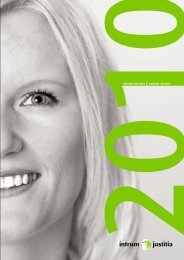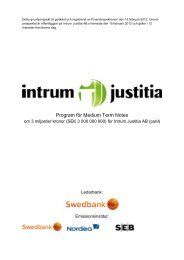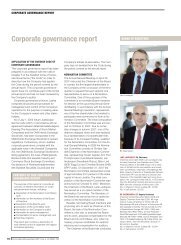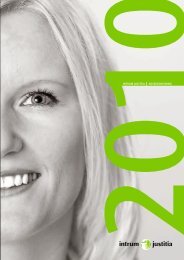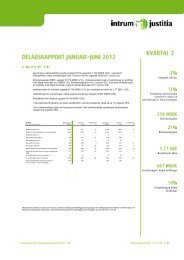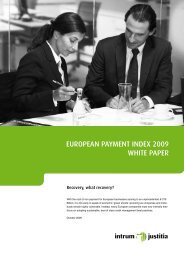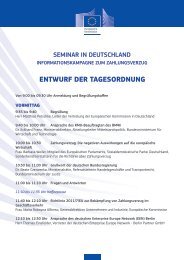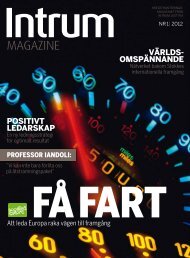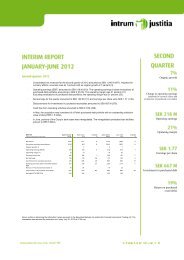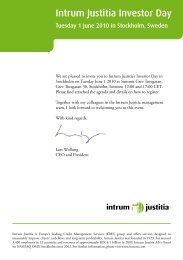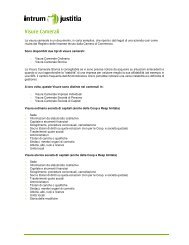Create successful ePaper yourself
Turn your PDF publications into a flip-book with our unique Google optimized e-Paper software.
DEPRECIATION/AMORTIZATION<br />
The Group’s depreciation/amortization for 2005 amounted to SEK 87.6 M<br />
(99.3). Operating earnings before depreciation/amortization thereby amounted<br />
to SEK 591.2 M (529.9).<br />
EXPENSES FOR INCENTIVE PROGRAM<br />
Operating earnings were charged with SEK 7.5 M (5.0) for warrants for the<br />
Group’s Employee Stock Option Program 2003/2009. The expense does not<br />
represent an actual disbursement by the company. The Employee Stock Option<br />
Program comprises warrants to subscribe for 3,358,250 shares. The dilution<br />
effect for 2005, calculated according to IAS 33 Earnings per share, corresponds<br />
to 673,038 shares.<br />
The Employee Stock Option Program did not dilute earnings for 2004 since<br />
the share’s average market value was less than the present value of the option<br />
premium. Most of the warrants were allotted in May 2004. In 2005 a limited<br />
number of warrants were allotted in connection with new hires and promotions.<br />
NET FINANCIAL ITEMS<br />
Net fi nancial items amounted to SEK –31.4 M (–36.4), an improvement due to<br />
low indebtedness and interest rates. During the fourth quarter indebtedness<br />
rose, however, in connection with the share redemption and related increase in<br />
interest expenses.<br />
CASH FLOW AND INVESTMENTS<br />
Cash fl ow from operating activities improved to SEK 527.0 M during the year,<br />
compared to SEK 485.3 M in 2004. The improvement in cash fl ow is less than<br />
the increase in working capital, which is partly due to tax payments. In 2004 a<br />
one-time repayment of SEK 53.5 M was received for tax previously paid in the<br />
UK for the years 2001–2003.<br />
Investments in tangible fi xed assets amounted to SEK 34.7 M (37.1) and in<br />
intangible fi xed assets other than goodwill SEK 62.2 M (34.5). The Group is not<br />
engaged in any research and development other than the development of its IT<br />
systems. Investments for the year largely pertain to hardware and software for IT<br />
systems, mainly for production. Technological development is rapid and, if used<br />
correctly, new technical solutions can improve effi ciency in receivables management.<br />
At the same time, demands are growing for customized IT solutions, and<br />
it is strategically important for <strong>Intrum</strong> <strong>Justitia</strong> to be able to continuously adapt to<br />
changes in demand. Investments during the year mainly refer to the implementation<br />
of a new production system in Norway and a discontinued project involving<br />
a new production system in the UK.<br />
For the full-year 2006 the Group anticipates investments in tangible and<br />
intangible fi xed assets of SEK 100–120 M.<br />
Payments for purchases of written off-receivables amounted to SEK 821.7 M<br />
(266.8) during the year.<br />
FINANCING<br />
Net debt as of December 31, 2005 amounted to SEK 1,192.7 M, compared to<br />
SEK 480.2 M at year-end 2004. The increase is mainly due to share redemptions<br />
of SEK 590.5 M during the year.<br />
Shareholders’ equity including the minority share amounted to SEK 1,316.1 M,<br />
compared to SEK 1,531.0 M on December 31, 2004.<br />
As of December 31, 2005 the Group had liquid assets of SEK 198.5 M,<br />
compared to SEK 338.3 M a year earlier. On December 31, 2005 unutilized credit<br />
facilities amounted to SEK 628.8 M. The corresponding fi gure on December 31,<br />
2004 was SEK 385.8 M.<br />
RISKS AND RISK MANAGEMENT<br />
While not intended to be comprehensive, the following list presents a number<br />
of risk factors that are considered especially important in determining <strong>Intrum</strong><br />
<strong>Justitia</strong>’s future.<br />
OPERATIONAL RISKS<br />
Operations in many countries<br />
The international scope of <strong>Intrum</strong> <strong>Justitia</strong>’s business entails risks, mainly due to<br />
differences in laws and regulations, various tax and accounting principles and<br />
currency effects in the more than twenty countries where the Group is active.<br />
There are major differences in legislation, culture, practices and market size<br />
between countries. To succeed in CMS throughout Europe requires a local presence<br />
and understanding of local conditions. Responsibility for managing and<br />
developing operations must lie to a signifi cant extent with the Group’s regions<br />
and national subsidiaries. The Group’s development is therefore dependent<br />
on the knowledge, experience, integrity and commitment of local and regional<br />
management as well as Group Management’s ability to oversee and control a<br />
decentralized organization.<br />
Expansion in different countries<br />
Future expansion may give rise to strains on managerial, operational and fi nancial<br />
resources stemming, for example, from the recruitment and training of new<br />
employees and the management of additional offi ces, IT systems and client<br />
contacts.<br />
Opportunities to successfully complete acquisitions are dependent on <strong>Intrum</strong><br />
<strong>Justitia</strong>’s ability to identify and evaluate acquisition targets and to effectively integrate<br />
them into existing operations. A potential acquisition may also depend on<br />
the approval of a government authority or other third party.<br />
Changes in the regulatory environment<br />
The CMS industry is regulated by various national statutes and regulations, which<br />
may also be affected by EU laws and directives. Changes in the regulatory<br />
environment may curtail <strong>Intrum</strong> <strong>Justitia</strong>’s future operations or involve cost increases<br />
in order to comply with regulations. Because of these risks, <strong>Intrum</strong> <strong>Justitia</strong><br />
continuously monitors the EU’s regulatory work in order to call attention to<br />
potentially negative effects for European CMS companies and lobbies for<br />
favorable rule changes.<br />
Cyclicality<br />
While certainly not unaffected by economic conditions, the CMS industry, in<br />
<strong>Intrum</strong> <strong>Justitia</strong>’s experience, has historically been affected less by economic<br />
fl uctuations than many other industries thanks to “stabilizing factors” during both<br />
good times and bad. For <strong>Intrum</strong> <strong>Justitia</strong>, the effects of economic conditions in<br />
individual markets are also mitigated by the Group’s geographic diversity.<br />
During periods of economic growth the number of business transactions rises,<br />
as does lending in general and thus the number of invoices in circulation. Payment<br />
capacity also increases, and consequently the percentage of invoices that result in<br />
overdue receivables and debt collection cases falls. In absolute terms, the number<br />
of overdue receivables and collection cases usually rises, however, at the same<br />
time that improved payment capacity leads to better opportunities to collect debt.<br />
Conversely, during recession, the number of business transactions and<br />
invoices decrease. Payment capacity is adversely affected, and consequently a<br />
larger proportion of invoices lead to overdue receivables and collection cases.<br />
The number of new cases decreases, while the number of debt surveillance<br />
cases rises and opportunities to collect worsen.<br />
FINANCIAL RISKS<br />
Risks inherent in purchased debt<br />
As part of its operations, <strong>Intrum</strong> <strong>Justitia</strong> acquires portfolios of written-off consumer<br />
receivables and works actively to collect them. Unlike conventional collection<br />
operations, where <strong>Intrum</strong> <strong>Justitia</strong> works on behalf of clients in return for commissions<br />
and fees, in this case it assumes all the rights and risks associated with the<br />
receivables. The portfolios are purchased at prices below their nominal value, and<br />
<strong>Intrum</strong> <strong>Justitia</strong> retains the entire amount it collects, including interest and fees.<br />
To minimize the risks in this business, <strong>Intrum</strong> <strong>Justitia</strong> exercises prudence in<br />
its purchase decisions. The focus is on small and medium-sized portfolios with<br />
relatively low average amounts, to help spread risks. Purchases are usually<br />
made from clients with whom the Group has maintained long relationships, so<br />
it is usually familiar with the receivables in question.<br />
<strong>Intrum</strong> <strong>Justitia</strong> places high yield requirements on purchased portfolios. Before<br />
every acquisition a careful assessment is made based on a projection of future<br />
cash fl ows (collected amount) from the portfolio. In its calculations, <strong>Intrum</strong> <strong>Justitia</strong><br />
is aided by its long experience in collection management and its scoring<br />
31



